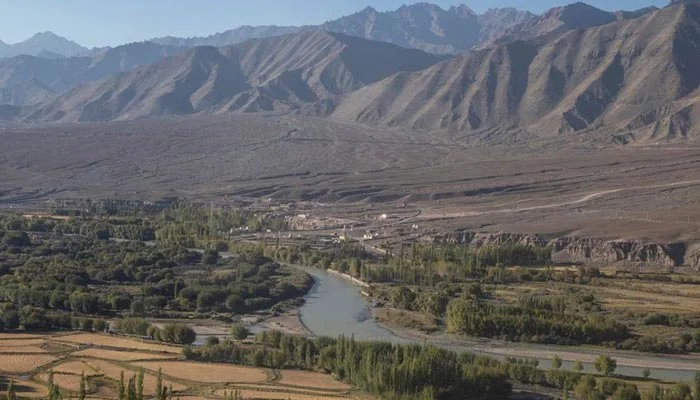Arshad Mahmood Awan
India’s recent posture on the Indus Waters Treaty (IWT) marks a disturbing shift from diplomacy to coercion, threatening to destabilise an already volatile South Asia. Indian Prime Minister Narendra Modi’s remarks in Rajasthan—where he provocatively stated that Pakistan would no longer have access to “Indian rivers”—have alarmed observers on both sides of the border. Modi’s threat to make Pakistan’s economy “pay” for so-called terrorism is not only irresponsible but a dangerous escalation that politicises shared natural resources.
The IWT, signed in 1960 with the World Bank’s mediation, is not a gift from India—it is a legally binding framework that has withstood wars, skirmishes, and decades of hostility. India’s current attempt to “hold the treaty in abeyance” is not just diplomatically immature; it is legally untenable. Any move to unilaterally suspend or undermine the IWT violates international law and established water-sharing norms under the Geneva Conventions. The very idea of altering river flows as a punitive measure turns water into a weapon—something the international community explicitly condemns.
India’s growing appetite to assert dominance over transboundary water sources is rooted in its desire to rewrite the regional order. New Delhi’s strategic thinkers have long viewed the IWT as overly generous to Pakistan. The post-Pahalgam military tensions have merely offered a convenient pretext to reassert these grievances. Yet, any such move undercuts the spirit of cooperative water management—a principle embedded in the United Nations’ Sustainable Development Goal 6.5, which urges collaborative governance of shared water systems.
Modi’s rhetoric, while potentially aimed at bolstering domestic political credentials, sets a dangerous precedent. It legitimises water blackmail as state policy. Threatening a lower riparian state like Pakistan not only violates bilateral commitments but could destabilise the region by opening a new front of conflict. When a nuclear-armed neighbour openly discusses disrupting water flows, the implications are existential.
Pakistan, being the lower riparian, depends on uninterrupted river flows from the Indus system—particularly the Chenab, Jhelum, and Indus rivers—for agriculture, hydropower, and drinking water. Any attempt by India to tamper with this flow—either through damming, storage, or unannounced releases—could wreak havoc on Pakistan’s already stressed water infrastructure. Recent events indicate India’s willingness to test these waters. New Delhi has blocked Chenab flows before, giving Islamabad a disturbing glimpse into what weaponised hydropolitics could look like.
Yet, experts advise against immediate panic. Diverting major rivers is neither technically simple nor quickly executable. It would require years of construction, funding, and technological coordination. However, Pakistan cannot afford to be complacent. The long-term threat is real—and existential. In the absence of a robust diplomatic, legal, and technical response, India’s provocations may gradually erode the treaty’s functional relevance.
The most pressing need of the hour is national consensus and bipartisan unity in Pakistan. Water security transcends political rivalry. The matter was rightly raised in Pakistan’s Senate, where lawmakers urged immediate and strategic international engagement. Islamabad must seize this moment to brief allies, international forums, and financial institutions about India’s aggressive hydropolitical moves.
Such diplomacy should focus not merely on condemnation but on legal clarity and geopolitical consequences. India’s threat to abrogate or suspend a multilateral treaty must be framed as a violation of international law. Major powers that claim to champion rule-based global order cannot afford to ignore such brinkmanship. If unchecked, it could become a template for other nations seeking to weaponise shared environmental resources.
Pakistan also needs to revisit its internal water governance. While India’s threats are real, the country must build resilience by improving water management, investing in modern irrigation, and accelerating construction of strategic dams like Diamer-Bhasha and Mohmand. At the same time, Pakistan must strengthen its technical capacity to monitor upstream flows and respond diplomatically and legally to any unjustified diversions.
This is also an opportunity for Pakistan to engage neutral international mediators. The World Bank, as a guarantor of the treaty, must be reminded of its obligations. Furthermore, organisations like the International Court of Justice and the UN Environmental Programme should be activated through strategic diplomacy. Pakistan can and must reframe India’s unilateralism as a global threat to water peace.
It is also vital to counter India’s narrative in the international media. By framing the treaty as a tool to “punish” terrorism, Modi’s administration is trying to recast a humanitarian agreement into a weapon of war. Such framing not only demonises Pakistan but undermines decades of global efforts to depoliticise access to shared natural resources. India’s domestic audience may cheer such declarations, but the world must see them for what they are—dangerous populism with catastrophic potential.
Regional competitors and neighbours must also watch this closely. If India succeeds in unilaterally disrupting Pakistan’s water supply without international consequence, it will set a precedent across Asia and Africa where transboundary rivers are already sites of dispute. The idea that water can be weaponised for political retaliation must be challenged, not only by Pakistan but by all responsible members of the global community.
Finally, the IWT must not be allowed to die by neglect or slow erosion. It has preserved water peace between two hostile nations for over 60 years. It is one of the few examples of successful conflict prevention in South Asia. Undermining it would not only hurt Pakistan—it would collapse a rare bridge of cooperation in the subcontinent.
In conclusion, India’s threats to abrogate or suspend Pakistan’s water share are not just legal violations—they are provocations with immense humanitarian, environmental, and geopolitical consequences. Pakistan must respond calmly but firmly—through diplomacy, legal mechanisms, public engagement, and institutional unity. The stakes are high, and the world must be made to understand: tampering with the Indus Waters Treaty is a red line, and crossing it would unleash a new era of conflict in an already unstable region.
















